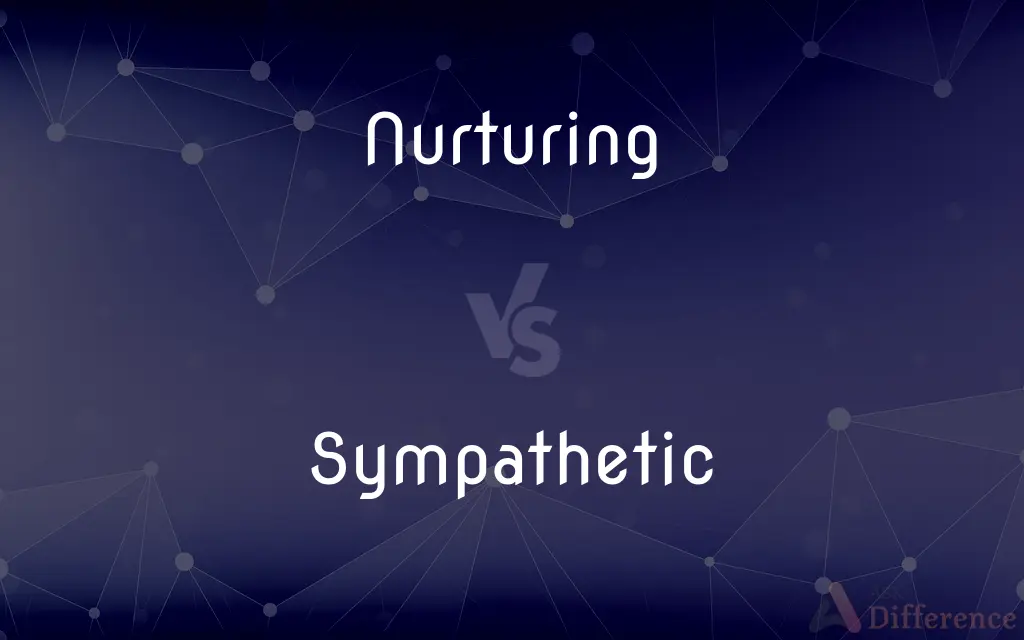Nurturing vs. Sympathetic — What's the Difference?
By Tayyaba Rehman — Published on October 18, 2023
Nurturing involves providing care, support, or encouragement, fostering growth or development; Sympathetic relates to feeling, showing, or expressing compassion, understanding, or commiseration.

Difference Between Nurturing and Sympathetic
Table of Contents
ADVERTISEMENT
Key Differences
Nurturing and Sympathetic are terms reflective of caring and understanding attitudes, but they apply differently. Nurturing typically relates to actions or behaviors that promote growth, development, or well-being. It entails providing care, support, encouragement, and often involves a prolonged effort to foster improvement or development. In contrast, being sympathetic relates to the ability to understand, empathize, or share the feelings of others, showing compassion or concern without necessarily involving actions or efforts to alter a situation.
While nurturing emphasizes actions and behaviors aimed at fostering positive outcomes, sympathetic denotes a state of emotional understanding or compassion, focusing on the emotional response to the situation or person. Nurturing is action-oriented, often involving practical efforts, persistent care, or support to promote well-being, development, or improvement. Meanwhile, being sympathetic primarily involves an emotional connection or response, an understanding, or sharing of feelings, which may or may not lead to action.
The term ‘nurturing’ usually implies a more proactive and involved approach, engaging in activities or behaviors that directly contribute to the betterment, growth, or development of individuals or entities. This involves providing a conducive environment, necessary resources, guidance, or support, aiming at tangible improvement or positive outcomes. Conversely, ‘sympathetic’ predominantly relates to emotional alignment or compassion, the capability to relate to the feelings or situations of others, offering emotional support or understanding, without necessarily engaging in actions to bring about change.
Nurturing might often require a sustained, active effort, an ongoing involvement in fostering growth or well-being, focusing on the developmental aspect, and the practical application of care and support. In contrast, sympathetic might not involve continuous effort or direct action, as it primarily denotes an emotional state, a capability to empathize, or a willingness to understand and share the feelings of others, reflecting a more passive form of support and connection.
Comparison Chart
Definition
Involves providing care, support, or encouragement.
Relates to feeling, showing, or expressing compassion or understanding.
ADVERTISEMENT
Application
Focused on actions that promote growth or well-being.
Primarily an emotional response to others’ feelings or situations.
Implication
Implies a proactive and involved approach.
Implies an emotional alignment or compassion.
Level of Involvement
Often requires sustained, active effort and direct actions.
May not involve continuous effort or direct actions.
Focus
On fostering positive outcomes and development.
On emotional understanding, connection, and support.
Compare with Definitions
Nurturing
Nurturing involves providing support, care, and encouragement to foster development and well-being.
The nurturing environment of the school helps in the holistic development of students.
Sympathetic
Sympathetic denotes a state of emotional alignment or connection with someone’s feelings or situation.
The sympathetic crowd applauded the underdog’s efforts.
Nurturing
Nurturing refers to the act of caring for and encouraging the growth or development of someone or something.
Her nurturing nature made her a favorite among the children.
Sympathetic
Sympathetic reflects a willingness to understand and share the feelings of others.
She gave a sympathetic nod, acknowledging his concerns.
Nurturing
Nurturing often involves practical efforts and persistent care to promote well-being.
Through nurturing care, the damaged plant was revived to full bloom.
Sympathetic
Sympathetic relates to the ability to understand, empathize, and share the feelings of others.
Her sympathetic words brought comfort to the grieving family.
Nurturing
Nurturing emphasizes actions and behaviors that are aimed at fostering positive outcomes.
Nurturing relationships are crucial for emotional well-being.
Sympathetic
Sympathetic primarily involves an emotional response, offering support, or understanding.
He listened to her problems with a sympathetic ear.
Nurturing
Nurturing implies a proactive and sustained effort to promote growth or improvement.
His nurturing approach helped the team to develop new skills.
Sympathetic
Sympathetic means showing compassion, understanding, or commiseration towards others.
He was sympathetic to her plight and offered his help.
Nurturing
The action of raising or caring for offspring
The nurture of an infant.
Sympathetic
Of, expressing, feeling, or resulting from sympathy
A sympathetic glance.
Nurturing
(Biology) The sum of environmental influences and conditions acting on an organism, especially in contrast to heredity.
Sympathetic
Favorably inclined
Not at all sympathetic to her proposal.
Nurturing
The fostering or overseeing of the development of something
The nurture of an idea.
Sympathetic
Agreeably suited to one's disposition or mood; congenial
Sympathetic surroundings.
Nurturing
Something that nourishes; sustenance
"The butterfly poked its tiny proboscis down into her hair, probing for nurture" (Barbara Kingsolver).
Sympathetic
Easy to identify with and care about; likeable
A gloomy novel without a single sympathetic character.
Nurturing
To raise or educate (a child, for example).
Sympathetic
Of, relating to, or acting on the sympathetic nervous system
A sympathetic neuron.
Sympathetic stimulation.
Nurturing
To encourage or help develop; cultivate
"a small college town that had nurtured his intellectual and creative pursuits" (James S. Hirsch).
Sympathetic
Relating to or being vibrations, especially musical tones, produced in one body by energy from a nearby vibrating body and having the same frequency as the vibration of the nearby body.
Nurturing
To provide sustenance for; nourish
The meadow that nurtures the cattle.
Sympathetic
Emitting such vibrations
Sympathetic strings.
Nurturing
Present participle of nurture
Sympathetic
Of, related to, feeling, showing, or characterized by sympathy.
John looked very upset. I gave him a sympathetic look.
Sympathetic
Showing approval of or favor towards an idea or action.
Sympathetic
Attracting the liking of others.
Sympathetic
(construction) Designed in a sensitive or appropriate way.
Sympathetic
(relational) Relating to, producing, or denoting an effect which arises through an affinity, interdependence, or mutual association.
Sympathetic magic is based on imitation or correspondence.
Sympathetic ink
Sympathetic
A supernatural connection or power resulting from two items having the same form or some other correspondence.
Sympathetic
(sound) Relating to musical tones produced by sympathetic vibration or to strings so tuned as to sound by sympathetic vibration.
Sympathetic
Relating to or denoting the part of the autonomic nervous system consisting of nerves arising from ganglia near the middle part of the spinal cord, supplying the internal organs, blood vessels, and glands, and balancing the action of the parasympathetic nerves.
Sympathetic innervation involves epinephrine.
Sympathetic
Inclined to sympathy; sympathizing.
Far wiser he, whose sympathetic mindExults in all the good of all mankind.
Sympathetic
Produced by, or expressive of, sympathy.
Ope the sacred source of sympathetic tears.
Sympathetic
Produced by sympathy; - applied particularly to symptoms or affections. See Sympathy.
Sympathetic
Of or relating to the sympathetic nervous system;
Sympathetic neurons
Sympathetic stimulation
Sympathetic
Expressing or feeling or resulting from sympathy or compassion or friendly fellow feelings; disposed toward;
Sympathetic to the students' cause
A sympathetic observer
A sympathetic gesture
Sympathetic
Having similar disposition and tastes;
A compatible married couple
With their many similar tastes, he found her a most sympathetic companion
Sympathetic
Showing or motivated by sympathy and understanding and generosity;
Was charitable in his opinions of others
Kindly criticism
A kindly act
Sympathetic words
A large-hearted mentor
Sympathetic
(of characters in literature or drama) evoking empathic or sympathetic feelings;
The sympathetic characters in the play
Sympathetic
Relating to vibrations that occur as a result of vibrations in a nearby body;
Sympathetic vibration
Common Curiosities
Can someone be sympathetic without taking action to help?
Yes, being sympathetic primarily involves an emotional connection or response and may not necessarily involve taking action.
Does nurturing involve providing care, support, or encouragement?
Yes, nurturing involves providing care, support, and encouragement.
Is being sympathetic about showing compassion or understanding?
Absolutely, being sympathetic is about showing compassion, understanding, or commiseration.
Does nurturing usually require a proactive and sustained effort?
Yes, nurturing typically implies a more proactive and involved approach, often requiring sustained effort.
Can nurturing actions promote growth or development?
Certainly, nurturing actions are aimed at fostering growth, development, or well-being.
Share Your Discovery

Previous Comparison
720p vs. 360p
Next Comparison
Rarity vs. ScarcityAuthor Spotlight
Written by
Tayyaba RehmanTayyaba Rehman is a distinguished writer, currently serving as a primary contributor to askdifference.com. As a researcher in semantics and etymology, Tayyaba's passion for the complexity of languages and their distinctions has found a perfect home on the platform. Tayyaba delves into the intricacies of language, distinguishing between commonly confused words and phrases, thereby providing clarity for readers worldwide.













































